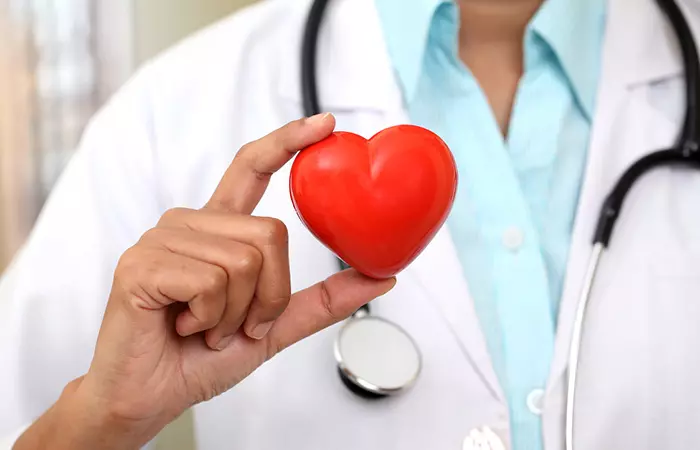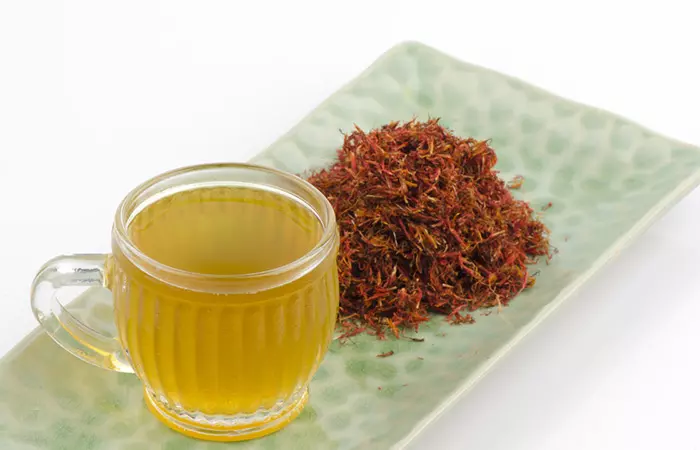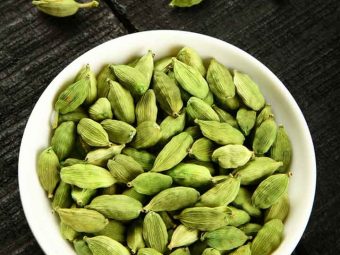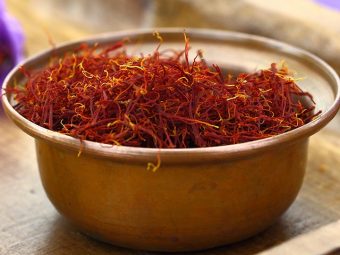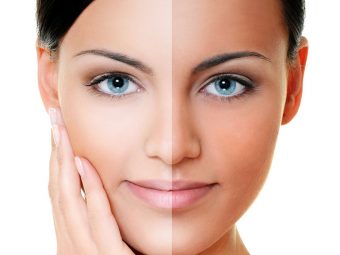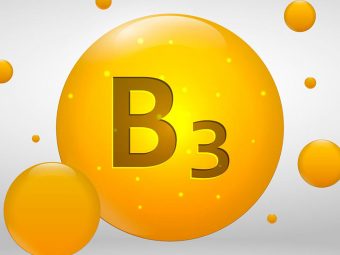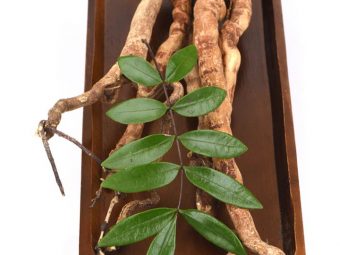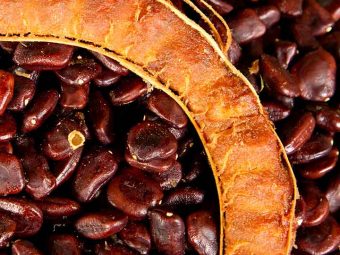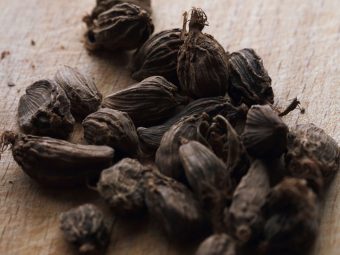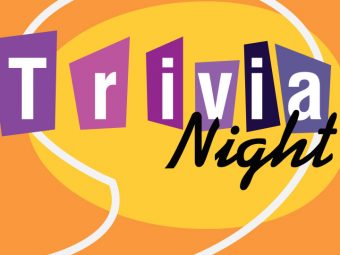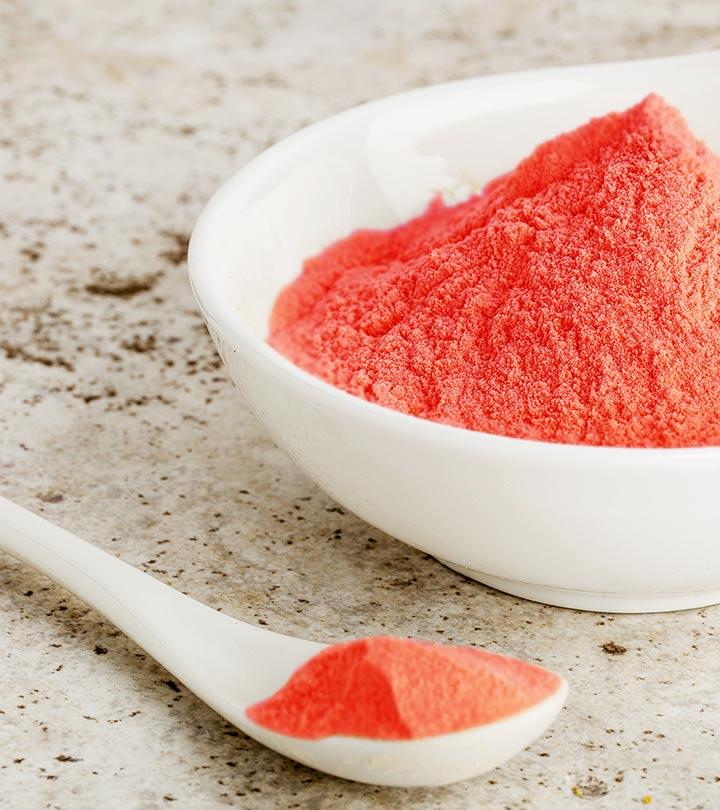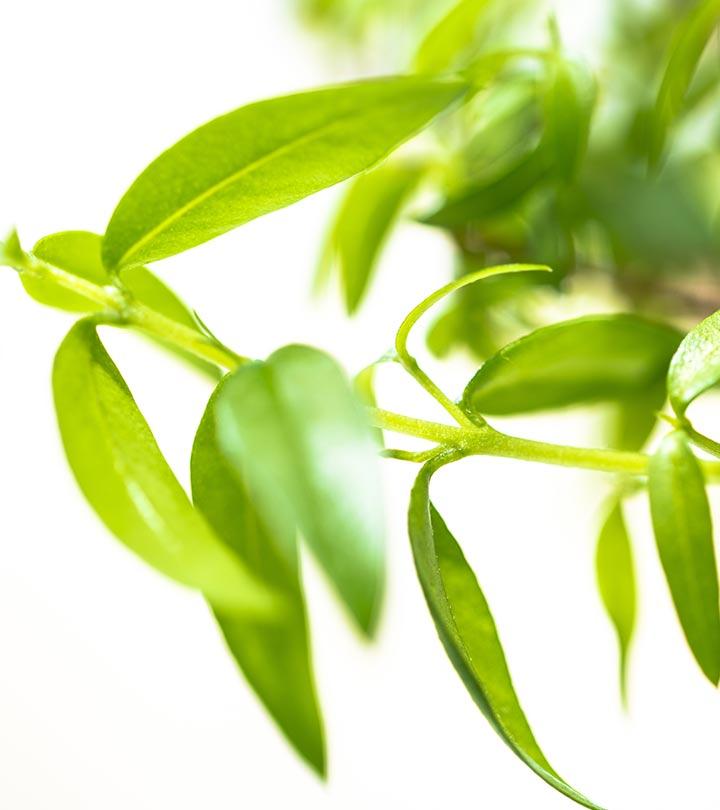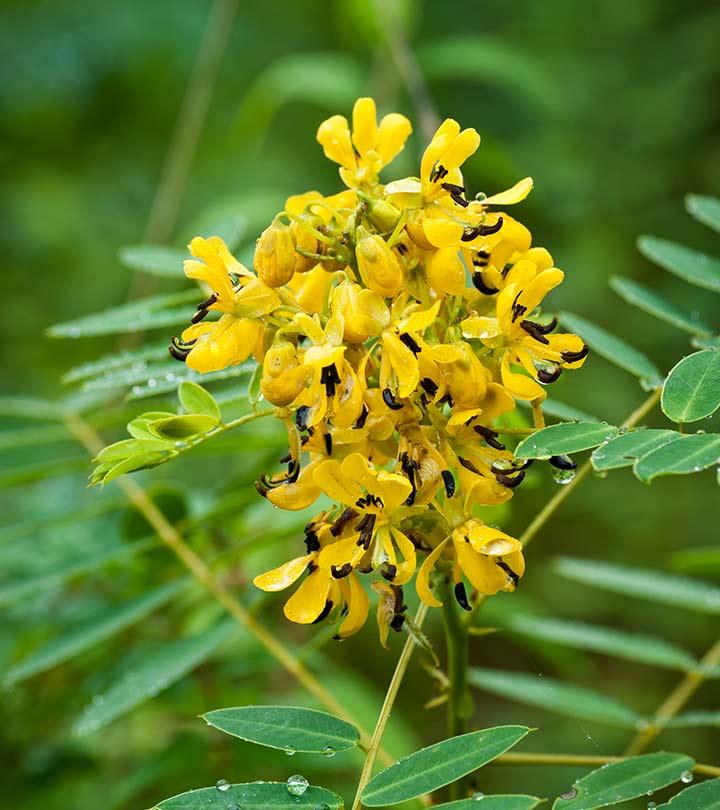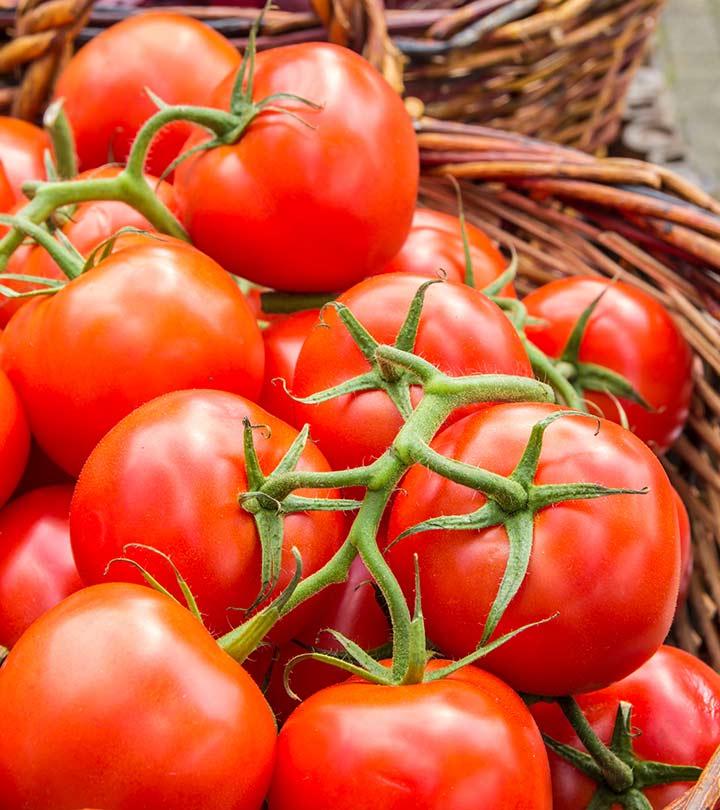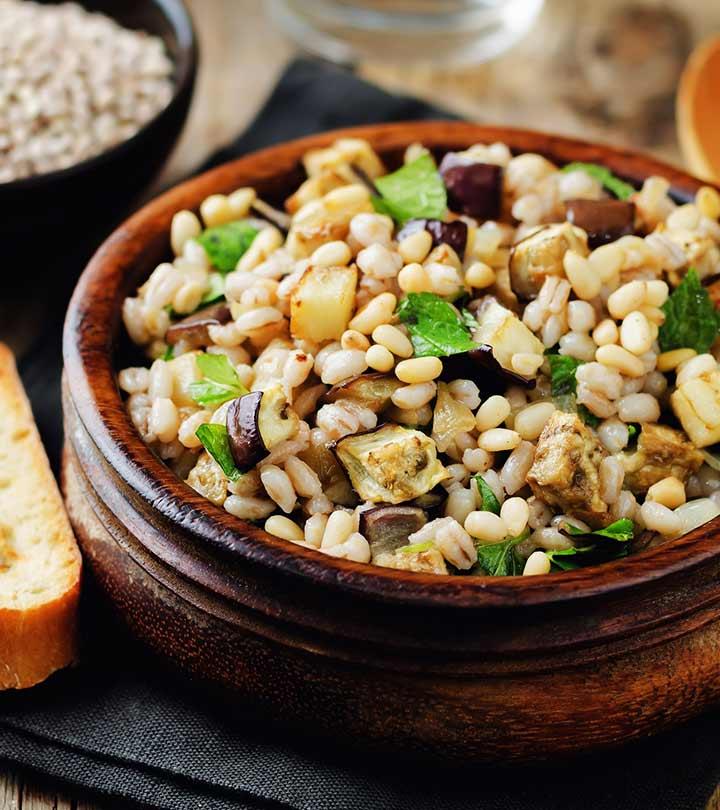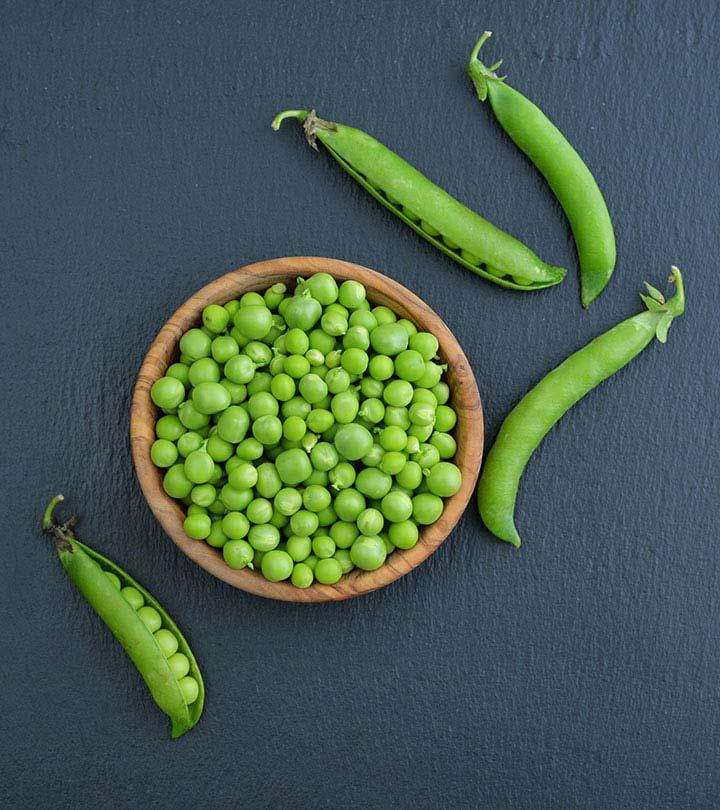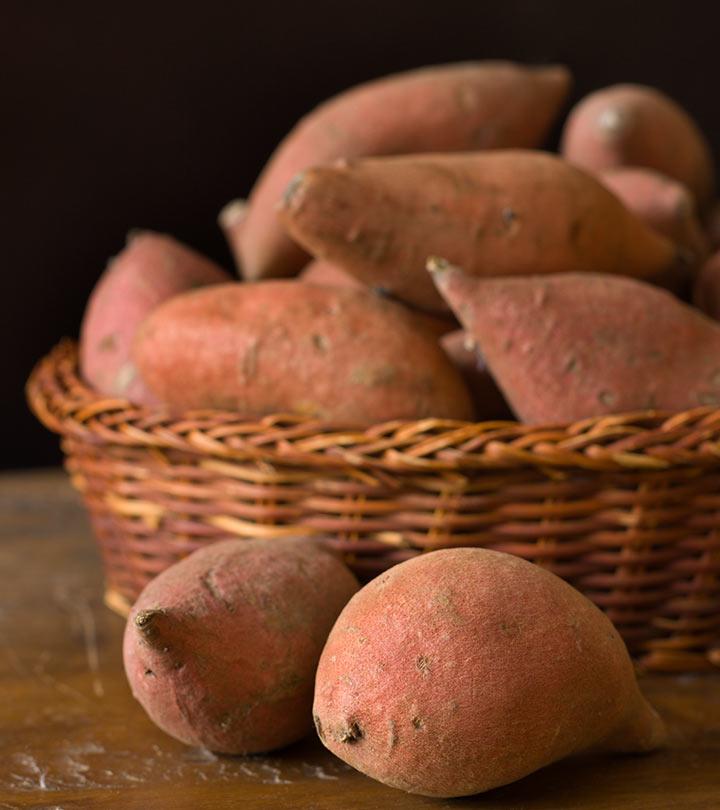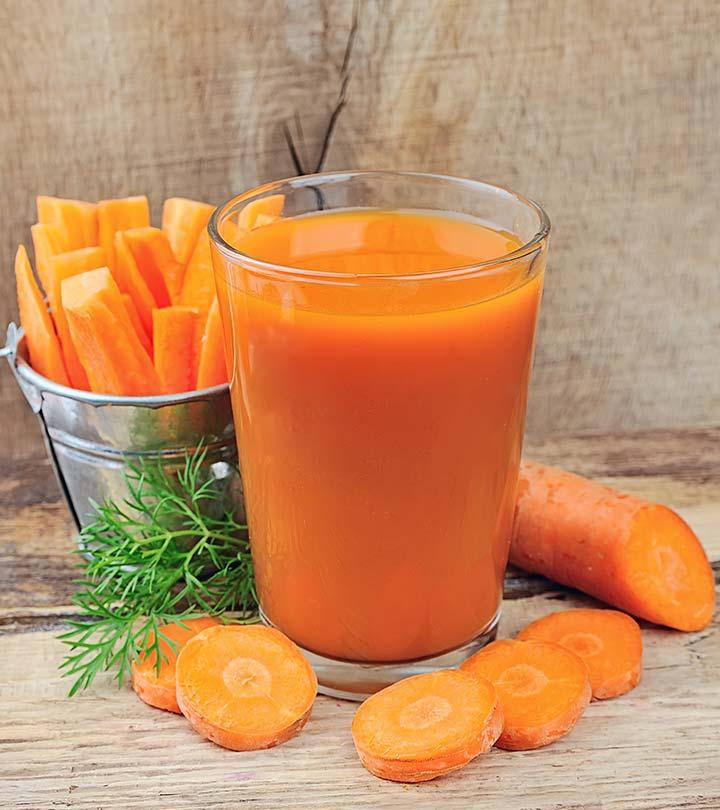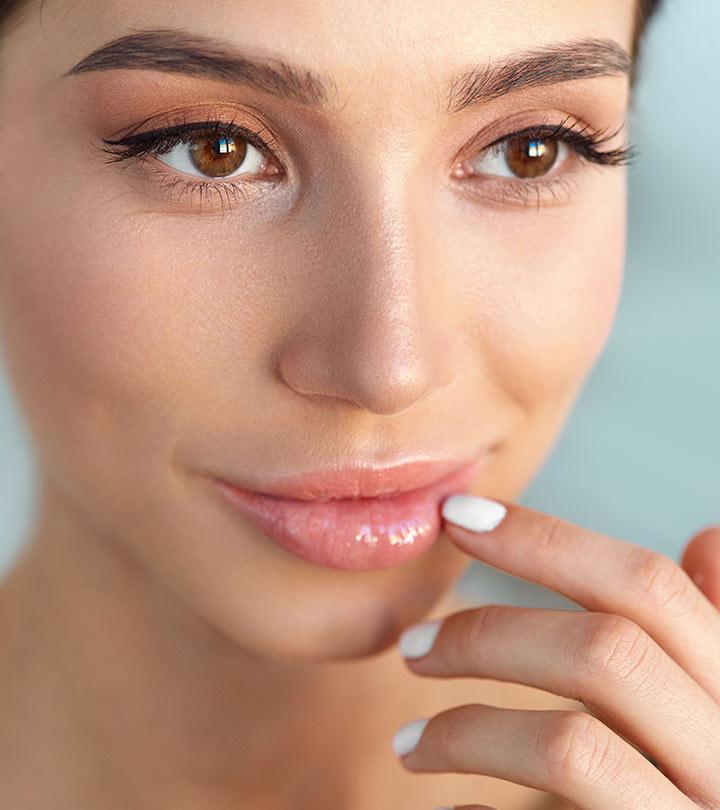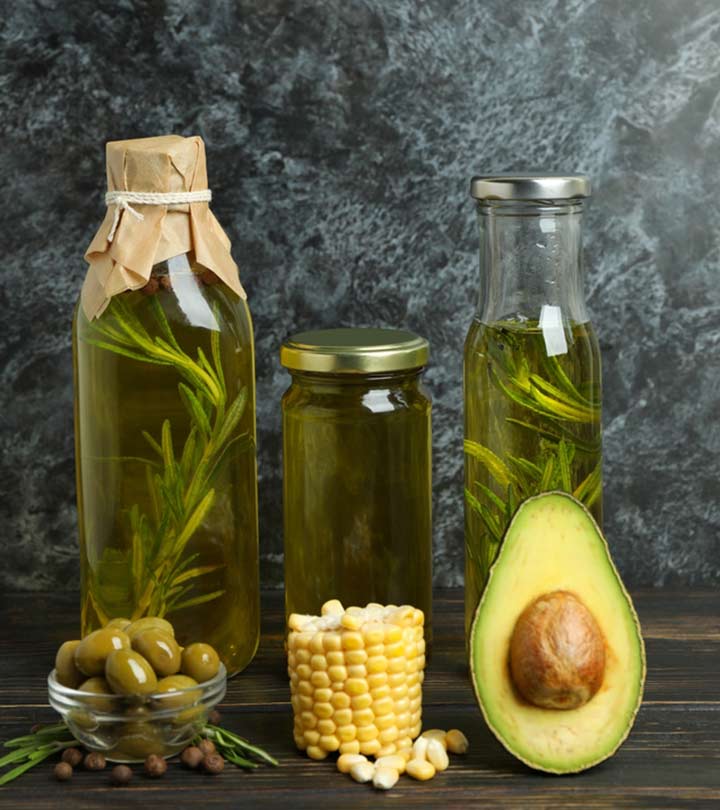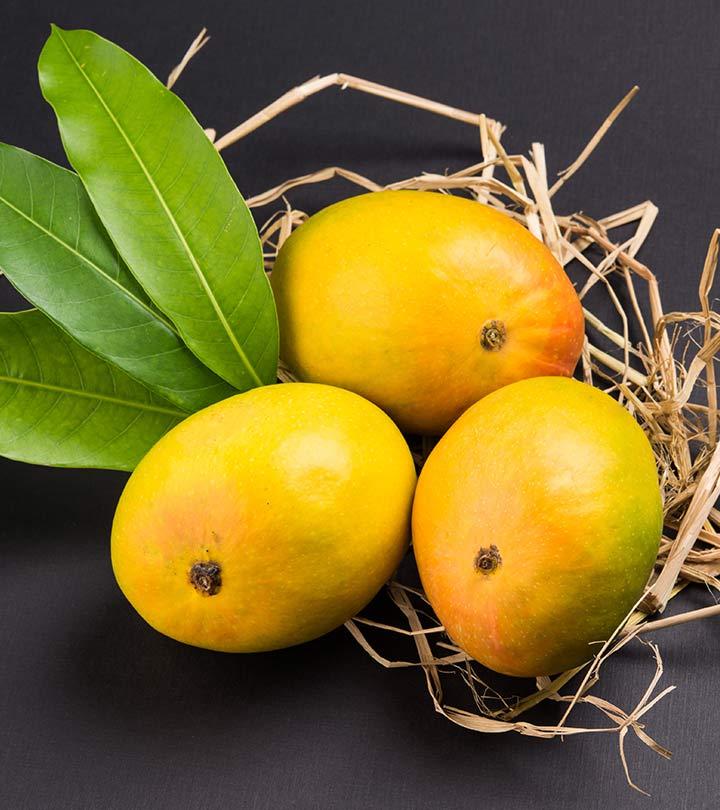15 Benefits Of Saffron(Kesar) For Skin & Health & How To Use It
Use this luxe spice to improve your complexion and protect it from the skin.
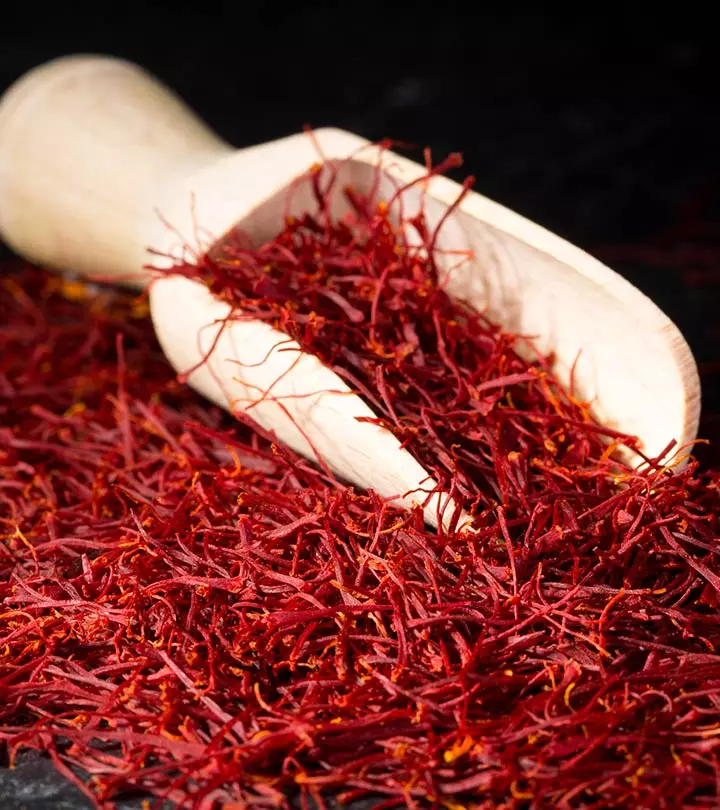
Image: iStock
Saffron benefits your health in numerous ways, and research is exploring more about this wonderful spice. Recent studies state that saffron has many medicinal properties and exhibits pharmacological activities (1). It is the most expensive spice, and a pound of it may cost around $500 to $5000. 300 tons of saffron is produced annually, and Iran produces 76% of it.
Hippocrates, who is regarded as the father of medicine, wrote about the benefits of kesar milk to combat insomnia, stomach issues, cold, cough,flatulencei XA natural process of the release of intestinal gas present in the digestive system through the anus. , uterine bleeding, and heart-related ailments.
Modern research also supports the claimed benefits of saffron. Keep reading to learn more about them and how saffron can improve your health!
 Know Your Ingredient: Saffron
Know Your Ingredient: SaffronWhat Is It?
It is the vivid crimson thread (used as a seasoning and coloring agent in food) taken from the saffron crocus flower. It is the most expensive spice.
What Are Its Benefits?
It may promote antioxidant, anticancer, anti-inflammatory, anti-hyperlipidemic, and photoprotective properties.
Who Can Consume It?
Those who want to boost eye, brain, and digestive health, treat insomnia, improve immunity, and heart health, and protect the skin can consume it.
How Often?
1 to 2 teaspoons of saffron in a glass of milk, water, or tea can be consumed daily.
Caution
High levels such as 10.5 grams can cause miscarriages, yellowing of skin, vomiting, dizziness, bloody diarrhea, numbness, poisoning, and bleeding from the lips, nose, and eyes.
In This Article
What Are The Health Benefits Of Saffron?
To begin with, Is saffron good for you? The answer is easy: Yes, the two major carotenoids in saffron, crocin, and crocetin may have antitumor effects. These compounds may also reduce inflammation risk. Safranal, another compound in the spice, was found to promote retinal health.
1. May Reduce Cancer Risk
Saffron is rich in two major carotenoids, namely crocin, and crocetin. Preclinical evidence demonstrates that certain carotenoids may have potent antitumor effects (2).
Literature data indicate that saffron could be used as a potential cancer chemopreventive agent. Even though some of the data looks convincing, more well-designed clinical trials in humans are warranted to ascertain the anticancer effects of saffron (2).
As per another report, though the exact mechanism of the anticancer effects of saffron is unclear, its carotenoids could play a role. More trials in humans are needed to arrive at a definite conclusion (3).
Saffron and its components have also been suggested as promising candidates for cancer prevention. Crocin, one of its compounds, was found to have high potency as a chemotherapeutic agenti XAgents that help treat cancer by inhibiting the proliferation and promoting the destruction of cancer cells in the body. (4).
2. May Help Fight Inflammation And Arthritis
An Italian study states that the crocetin in saffron promotes cerebral oxygenation in rats and positively acts in arthritis treatment. This effect could most likely be attributed to its antioxidant activity. However, these results have been obtained only in vitro or on laboratory animals and not yet on humans (5).
Extracts of petals of the saffron plant were also found to have chronic anti-inflammatory activity. This effect could be attributed to the presence of flavonoids, tannins, alkaloids, and saponins. However, the other chemical constituents of saffron and their mechanisms are yet to be investigated (6).
3. May Boost Vision Health
In rat studies, safranal, a constituent of saffron, was found to delay retinal degeneration. The compound could also reduce rod and cone photoreceptor loss. These properties make safranal potentially useful for delaying retinal degeneration in retinal pathologies (7).
Saffron supplementation was also found to induce a mid-term, significant improvement in the retinal function in the case of age-related macular degeneration. However, more research is warranted with respect to saffron supplementation in clinical practice (8).
4. May Help In Insomnia Treatment
In rat studies, the crocin in saffron was found to boost non-rapid eye movement sleep. Crocetin, the other carotenoid in saffron, could also increase the total time of non-REM sleep by as much as 50% (9).
Other clinical trials also indicate that saffron supplementation could help improve symptoms of depression in adults dealing with major depressive disorder. One of the symptoms, as per research, is insomnia. Valeria Dolbel, a certified holistic nutritionist, says, “Saffron has soothing properties, making it safe to drink before bedtime, which helps treat insomnia, improve sleep quality, and aid restorative sleep in healthy adults experiencing poor sleep.”
However, further long-term follow-ups are required before firm conclusions can be made in this regard (10).
5. May Promote Brain Health
The antioxidant and anti-inflammatory properties of saffron extracts could imply its therapeutic potential for various issues of the nervous system. The spice interacts with the cholinergici XA component of the nervous system that regulates heartbeat, blood pressure, and other bodily functions. and dopaminergic systemsi XA system that controls the motor and cognitive functions of the body, such as learning, thinking, and behavior. , which may have beneficial effects in the case of Alzheimer’s or Parkinson’s (11).
However, more investigations are needed to have a detailed perspective of saffron’s effects on the human nervous system.
Some accumulating evidence also suggests that crocin in saffron could play a role in cognition. In animal models, this carotenoid in saffron could attenuate memory disorders related to Alzheimer’s, cerebral injuries, and schizophrenia (12).
However, saffron’s potential efficacy in memory disorders related to traumatic brain injury and brain ischemiai XA condition where there is an insufficient supply of blood to the brain, leading to low oxygen and nutrient supply. is yet to be investigated (12).
6. May Promote Digestive Health
Most animal studies show saffron to exhibit antioxidant, anticancer, anti-inflammatory, and anti-hyperlipidemici XAgents that help lower cholesterol levels in the blood and, in turn, reduce the risk of cardiovascular disease. effects in treating gastrointestinal digestion. However, the efficacy of the spice in treating human gastrointestinal issues is yet to be investigated and understood (13).
7. May Heal Burn Wounds
One rat study links the possible wound healing properties of saffron to its antioxidant and anti-inflammatory activity. Saffron could significantly increase re-epithelialization in burn wounds, as compared to cream-treated wounds (14).
The study raises the possibility of the potential efficacy of saffron in accelerating wound healing in burn injuries (14).
8. May Enhance Immunity
Kesar benefits your immune system. Saffron is rich in carotenoids that seem to impact immunity. A study done on healthy men showed that daily use of saffron (about 100 mg) could have temporaryimmunomodulatory effectsi XEffects known to suppress or stimulate the immune system and help the body combat cancer, infection, or other diseases. without any adverse reactions (15).
9. May Offer Relief From Menstrual Symptoms
The benefits of saffron for females include relief from menstrual symptoms, such as cramps and nausea. A herbal drug containing saffron was found to offer relief to women with primary dysmenorrhea. The study concluded by stating the need for more clinical trials to determine the efficacy of the herbal drug (16).
10. May Improve Heart Health
Saffron helps reduce the risk of heart disease by strengthening the circulatory system. The spice is rich in thiamin and riboflavin, and these promote a healthy heart and help prevent various cardiac issues (17).
Due to its antioxidant properties, saffron helps maintain healthy arteries and blood vessels. The spice’s anti-inflammatory properties also benefit the heart. The crocetin in the spice indirectly regulates blood cholesterol levels and reduces the severity of atherosclerosis (17).
Saffron may also be useful in treating hypertension, as per a rat study (18).
11. May Protect The Liver
Some research suggests that saffron benefits patients dealing with liver metastasis. The carotenoids in saffron may help inhibit the production of reactive oxygen species. But further investigations with a much larger sample size are required to arrive at any conclusion (19).
The safranal in saffron may also protect the liver from the environmental toxins. But this finding hasn’t been verified yet by human clinical trials. Hence, further human studies are warranted (20).
12. May Work As An Aphrodisiac
The crocin in saffron could improve sexual behavior in male rats. It could increase mounting frequency and erection frequency in the rats (21). However, the safranal in the spice did not exhibit any aphrodisiac effects.
Saffron was also found to be effective in improving sperm morphology and motility in infertile men. It wasn’t found to improve the sperm count, though. Further studies involving large sample sizes are needed to elucidate the potential role of saffron in treating male infertility (22).
In another study, crocin could improve some reproductive parameters in mice treated with nicotine. The study speculates that the antioxidant effects of saffron could have been a major reason behind this particular positive impact. Further studies are needed to define the spice’s exact mechanism of action (23).
13. May Reduce ADHD Symptoms
Some studies have shown that saffron, when paired with other FDA-approved medication, may help effectively reduce ADHD symptoms (24). Saffron is helpful in dealing with hyperactivity symptoms, as observed in these studies, while the medications are more effective in improving attentiveness. Further, while prescribed medication improves sleep quality in individuals with ADHD, saffron has been noted to have a relaxing effect that makes it easier to naturally fall asleep and increases the duration of time abed. Saffron’s carotenoids also have powerful antioxidant, anti-tumor, and anti-inflammatory properties that are being researched for their efficacy in treating other neuropsychiatric and neurodegenerative diseases.
Wondering what is saffron good for when it comes to your skin? That’s exactly what we will address next. Let us find out!
How Does Saffron Help Your Skin?
Saffron offers protection to the skin, thanks to its photoprotective and moisturizing effects.
14. May Protect Skin From UV Radiation
Studies suggest that saffron could be used as a natural UV-absorbing agent. It contains flavonoid compounds like kaempherol and quercetin, which could be contributing in this regard (25).
Saffron’s photoprotective effects may also be due to its other phenolic compounds, such as tannic, gallic, caffeic, and ferulic acids. A few of these compounds are used as active ingredients in various sunscreens and skin lotions (25).
However, saffron doesn’t seem to have any special moisturizing effect (25).
But be cautious of using saffron on your skin and be careful of the amount as saffron may cause the skin to turn yellow if used in excess (26).
These were the benefits of kesar. But what are the nutrients that make saffron this beneficial? Let us check its nutritional profile to learn the same.
15. May Enhance Complexion
We do not recommend the use of any ingredient with the sole purpose of whitening one’s skin. But saffron has shown certain complexion promotion effects (26).
What Is The Nutritional Profile Of Saffron?
| Spices, Saffron | ||
| Serving Size: 1 teaspoon (0.7 g) | ||
| Nutrient | Amount | Unit |
|---|---|---|
| Water | 0.083 | g |
| Energy | 2.17 | kcal |
| Energy | 9.09 | kJ |
| Protein | 0.08 | g |
| Total lipid (fat) | 0.041 | g |
| Carbohydrate, by difference | 0.458 | g |
| Fiber, total dietary | 0.027 | g |
| Minerals | ||
| Calcium, Ca | 0.777 | mg |
| Iron, Fe | 0.078 | mg |
| Magnesium, Mg | 1.85 | mg |
| Phosphorus, P | 1.76 | mg |
| Potassium, K | 12.1 | mg |
| Sodium, Na | 1.04 | mg |
| Zinc, Zn | 0.008 | mg |
| Copper, Cu | 0.002 | mg |
| Manganese, Mn | 0.199 | mg |
| Selenium, Se | 0.039 | µg |
| Vitamins | ||
| Vitamin C, total ascorbic acid | 0.566 | mg |
| Thiamin | 0.001 | mg |
| Riboflavin | 0.002 | mg |
| Niacin | 0.01 | mg |
| Vitamin B-6 | 0.007 | mg |
| Folate, food | 0.651 | µg |
| Vitamin B-12 | 0 | µg |
| Vitamin A, RAE | 0.189 | µg |
| Retinol | 0 | µg |
| Vitamin A, IU | 3.71 | IU |
| Vitamin D (D2 + D3) | 0 | µg |
| Vitamin D | 0 | IU |
| Fatty acids | ||
| Fatty acids, total saturated | 0.011 | g |
| Fatty acids, total monounsaturated | 0.003 | g |
| Fatty acids, total polyunsaturated | 0.014 | g |
Source: USDA, spices, saffron
The benefits of saffron extracts can be attributed to its wonderful nutrition profile. It is a versatile spice, and you can use it in more ways than one. In the following section, we have discussed the different ways you can use it.
How To Use Saffron?
Saffron not only imparts a distinct flavor and aroma but also makes your dish look more presentable. Saffron can be used in thread or ground form, depending on the recipe. If you are using saffron to garnish your dish and wish to create a visual impression, you can use threads. On the other hand, if you want the saffron to blend with your dish such that it is not obvious to the eye, you should go for its powdered form.
The uses of saffron and cooking tips given below will enable you to reap the maximum benefits from this magical spice:
- You can prepare powdered saffron instead of buying it from a supplier. You can do this by grinding the saffron threads with a mortar and pestle. If you find it difficult to grind the threads due to the moisture content, add a pinch of sugar to them and then grind. This will make grinding easier without affecting your recipe.
- You can make liquid saffron by adding 3 to 5 teaspoons of warm or boiling water to powdered saffron and allow it to infuse for 5 to 10 minutes. Store it in a jar for a few weeks and use it when needed. Liquid saffron can also be prepared with milk, vinegar, or wine instead of water. It is usually added to other ingredients towards the end of cooking to draw out the color and disperse the flavor throughout the dish.
- You can also make saffron milk. You need 1 cup of boiled milk, a pinch of saffron, and 2 teaspoons of sugar (if needed). Add the sugar and saffron to boiled milk. This saffron milk tea can be a good addition to your regular routine.
Miriam James Sebastian, a vlogger, shares a quick and easy saffron-infused drink recipe that is beneficial for your skin and overall health. She emphasizes its benefits, like improved skin complexion, relief from PMS symptoms, and better digestion. She says, “It doesn’t even take you two minutes to make (i).” She adds, “I don’t drink it every day. I wouldn’t recommend you drink it every day; give one day’s gap.”
 Trivia
TriviaThough it is easy to use saffron, it is important to know its dosage.
Saffron Dosage And Side Effects
Some research states that 10.5 grams of saffron a day can cause toxic side effects. These include headache, dizziness, and loss of appetite, weakness, and, in extreme cases, may also be harmful to the lungs and kidneys (26).
For pregnant women, the daily upper limit for saffron, as per some sources, is 5 grams (28). Taking saffron orally in large amounts during pregnancy can cause problems – it can lead to contractions of the uterus and miscarriage (29). There is insufficient information with respect to breastfeeding. Hence, avoid use and stay safe.
It is important to note that exposure to high levels of saffron could increase the miscarriage rate, as per studies done on female rats. Studies suggest the use of high dose saffron by pregnant women (29).
Global Saffron Market
According to the global saffron market analysis, the revenue from saffron is forecasted to grow at 7.3% CAGR through 2021 to 2029. Though saffron is formulated in powder, thread, and liquid forms, the thread segment is expected to dominate the market globally. Using powdered saffron in food, beverages, and medicines will also help increase its global market. However, the low availability of saffron in liquid form will affect its growth during the forecast period. Find out the exact percentage of saffron’s global market share here.
Global Saffron Market Segment Based On Formulation
Source: Maximize Market Research Trivia
TriviaInfographic: Saffron – A Peek At The World’s Most Expensive Spice
Saffron is considered red gold due to its high popularity and scarce availability. Its unique flavor and aroma have captured many hearts, which is why its popularity has not dwindled.
Discover in the infographic below why this spice is so expensive, some important statistics, and its global appeal. Illustration: StyleCraze Design Team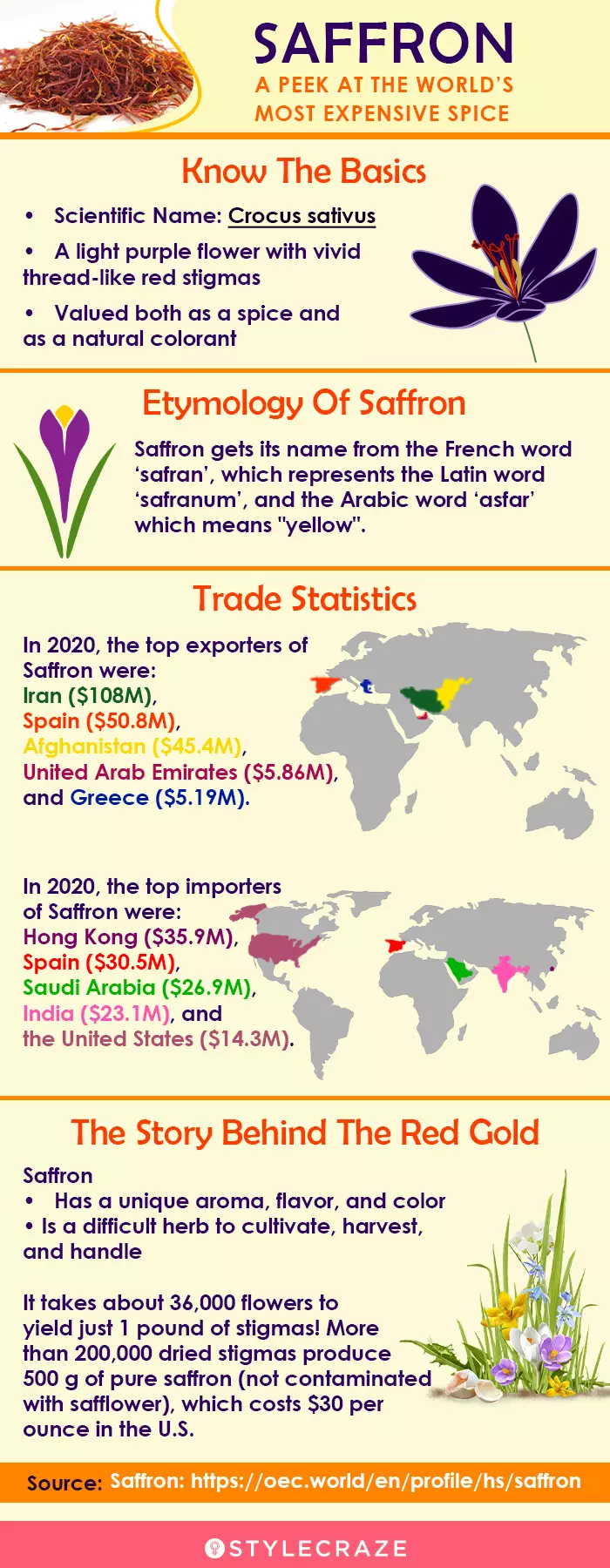
Saffron is a popular spice that boasts a varied nutritional profile. The benefits of saffron can be attributed to its active compounds like crocetin and safranal, which promote one’s overall health. Saffron may help boost energy, vitality, vision, immunity, and brain, gut, heart, and liver health. It may reduce inflammation, promote sleep, and accelerate wound healing. It is also good for your skin, as it can promote a healthy skin complexion. However, pregnant or breastfeeding women must not consume saffron. If you have any medical condition, consult your doctor before consuming saffron.
Frequently Asked Questions
Does saffron work immediately?
Pallini Winnifred, RDN, says, “The effects of saffron may not be immediate, and it may take several weeks to notice any benefits.”
Does saffron help you lose weight?
Winnifred says, “Some studies have suggested that saffron may help with weight loss by reducing appetite, but more research is needed to confirm this.”
How much does 1 gram of saffron cost?
A gram of saffron can cost anywhere between $6 to $8.
Does saffron expire?
Though saffron does not expire or spoil, it can lose its flavor and potency over time (usually in two to four years).
How to know if my saffron is pure?
Pure saffron tastes slightly bitter. It does not taste sweet. If your saffron is tasting sweet, it may not be the one you want. Also, check for the ISO 3632-1:2011 certification on the pack.
You can also put a few threads of saffron on your tongue and suck them. Take them out and rub them on a tissue. If they color the tissue yellow, they are real. Otherwise, they are not.
What is the best way to store saffron?
You can store saffron in an airtight container in a cool and dark place. Do not store it in the refrigerator as the spice may develop fungus due to the moist environment all around.
Does saffron help treat acne?
There is no evidence that saffron can help in acne treatment.
Can I take saffron/saffron milk daily?
Yes, you can drink it every day to enjoy the benefits of kesar milk, such as protection from colds and flu and relieving menstrual symptoms. But be careful of the amount. Just 1 to 2 teaspoons should do. Pregnant women must keep away from saffron.
Should I take saffron in the morning or at night?
There is no specific time that is recommended for taking saffron. You can have it in the morning on an empty stomach, in the evening, or at night.
Does saffron help with anxiety?
The aroma of saffron has been found to help decrease stress-induced heart rate variability, it is mood-enhancing, and it improves depressive symptoms in people (30).
Key Takeaways
- Saffron is a unique spice with multiple benefits. Its source is a flower named Crocus Sativus.
- Saffron has antioxidant, anti-inflammatory, and anti-cancer properties which benefit our immune system, improve our brain health, protect us against skin damage, and improve menstrual cramps and other issues.
- Saffron also manages anxiety, regulates blood pressure, and improves metabolism.
- Saffron has been in medical use for centuries. Ayurvedic medicines often contain saffron as a main ingredient for many diseases.
_for_skin__health__how_to_use_it_illustration.jpg.webp)
Image: Dall·E/StyleCraze Design Team
References
Articles on StyleCraze are backed by verified information from peer-reviewed and academic research papers, reputed organizations, research institutions, and medical associations to ensure accuracy and relevance. Read our editorial policy to learn more.
- An overview on saffron, phytochemicals, and medicinal properties, Pharmacognosy Review, US National Library of Medicine, National Institutes of Health.
https://www.ncbi.nlm.nih.gov/pmc/articles/PMC3731881/ - Crocus sativus L. (saffron) for cancer chemoprevention: A mini review, Journal of Traditional and Complementary Medicine, US National Library of Medicine, National Institutes of Health.
https://www.ncbi.nlm.nih.gov/pmc/articles/PMC4488115/ - Anticarcinogenic effect of saffron (Crocus sativus L.) and its ingredients, Pharmacognosy Research, US National Library of Medicine, National Institutes of Health.
https://www.ncbi.nlm.nih.gov/pmc/articles/PMC3996758/ - Does Saffron Fight Cancer? A Plausible Biological Mechanism, American Council on Science and Health.
https://www.acsh.org/news/2017/07/20/does-saffron-fight-cancer-plausible-biological-mechanism-11587 - Crocetin from saffron: an active component of an ancient spice, Critical Reviews in Food Science and Nutrition, US National Library of Medicine, National Institutes of Health.
https://www.ncbi.nlm.nih.gov/pubmed/15239370 - Antinociceptive and anti-inflammatory effects of Crocus sativus L. stigma and petal extracts in mice, BMC Pharmacology, US National Library of Medicine, National Institutes of Health.
https://www.ncbi.nlm.nih.gov/pubmed/11914135 - Natural Compounds from Saffron and Bear Bile Prevent Vision Loss and Retinal Degeneration, Molecules, US National Library of Medicine, National Institutes of Health.
https://www.ncbi.nlm.nih.gov/pmc/articles/PMC6332441/ - Short-term Outcomes of Saffron Supplementation in Patients with Age-related Macular Degeneration: A Double-blind, Placebo-controlled, Randomized Trial, Medical Hypothesis, Discovery & Innovation Ophthalmology Journal, US National Library of Medicine, National Institutes of Health.
https://www.ncbi.nlm.nih.gov/pmc/articles/PMC5342880/ - Crocin promotes non-rapid eye movement sleep in mice, Molecular Nutrition and Food Research, US National Library of Medicine, National Institutes of Health.
https://www.ncbi.nlm.nih.gov/pubmed/22038919 - Saffron (Crocus sativus L.) and major depressive disorder: a meta-analysis of randomized clinical trials, Journal of Integrative Medicine, US National Library of Medicine, National Institutes of Health.
https://www.ncbi.nlm.nih.gov/pmc/articles/PMC4643654/ - The effects of Crocus sativus (saffron) and its constituents on nervous system: A review, Avicenna Journal of Phytomedicine, US National Library of Medicine, National Institutes of Health.
https://www.ncbi.nlm.nih.gov/pmc/articles/PMC4599112/ - The Effect of Crocus sativus L. and Its Constituents on Memory: Basic Studies and Clinical Applications, Evidence-Based Complementary and Alternative Medicine, US National Library of Medicine, National Institutes of Health.
https://www.ncbi.nlm.nih.gov/pmc/articles/PMC4331467/ - Therapeutic effects of saffron (Crocus sativus L.) in digestive disorders: a review, Iranian Journal of Basic Medical Sciences, US National Library of Medicine, National Institutes of Health.
https://www.ncbi.nlm.nih.gov/pmc/articles/PMC4923465/ - The effect of saffron (Crocus sativus) extract for healing of second-degree burn wounds in rats, The Keio Journal of Medicine, US National Library of Medicine, National Institutes of Health.
https://www.ncbi.nlm.nih.gov/pubmed/19110531 - Immunomodulatory effects of saffron: a randomized double-blind placebo-controlled clinical trial, Phytotherapy Research, US National Library of Medicine, National Institutes of Health.
https://www.ncbi.nlm.nih.gov/pubmed/21480412 - The effect of an Iranian herbal drug on primary dysmenorrhea: a clinical controlled trial, Journal of Midwifery & Women’s Health, US National Library of Medicine, National Institutes of Health.
https://www.ncbi.nlm.nih.gov/pubmed/19720342/ - Cardiovascular Effects of Saffron: An Evidence-Based Review, Journal of Tehran University Heart Center, US National Library of Medicine, National Institutes of Health.
https://www.ncbi.nlm.nih.gov/pmc/articles/PMC3466873/ - Dietary saffron reduced the blood pressure and prevented remodeling of the aorta in L-NAME-induced hypertensive rats, Iranian Journal of Basic Medical Sciences, US National Library of Medicine, National Institutes of Health.
https://www.ncbi.nlm.nih.gov/pmc/articles/PMC4764118/ - Effect of saffron on liver metastases in patients suffering from cancers with liver metastases: A randomized, double blind, placebo-controlled clinical trial, Avicenna Journal of Phytomedicine, US National Library of Medicine, National Institutes of Health.
https://www.ncbi.nlm.nih.gov/pmc/articles/PMC4599117/ - Saffron as an antidote or a protective agent against natural or chemical toxicities, DARU Journal of Pharmaceutical Sciences, US National Library of Medicine, National Institutes of Health.
https://www.ncbi.nlm.nih.gov/pmc/articles/PMC4418072/ - The effect of saffron, Crocus sativus stigma, extract and its constituents, safranal and crocin on sexual behaviors in normal male rats, Phytomedicine, US National Library of Medicine, National Institutes of Health.
https://www.ncbi.nlm.nih.gov/pubmed/17962007 - Effect of saffron on semen parameters of infertile men, Urology Journal, US National Library of Medicine, National Institutes of Health.
https://www.ncbi.nlm.nih.gov/pubmed/19101900 - Crocin Improves Damage Induced by Nicotine on A Number of Reproductive Parameters in Male Mice, International Journal of Fertility & Sterility, US National Library of Medicine, National Institutes of Health.
https://www.ncbi.nlm.nih.gov/pmc/articles/PMC4845532/ - Effectivity of Saffron Extract (Saffr’Activ) on Treatment for Children and Adolescents with Attention Deficit/Hyperactivity Disorder (ADHD): A Clinical Effectivity Study
https://www.ncbi.nlm.nih.gov/pmc/articles/PMC9573091/ - Does Saffron Have Antisolar and Moisturizing Effects?, Iranian Journal of Pharmaceutical Research, US National Library of Medicine, National Institutes of Health.
https://www.ncbi.nlm.nih.gov/pmc/articles/PMC3862060/ - A Survey on Saffron in Major Islamic Traditional Medicine Books, Iranian Journal of Basic Medical Sciences, US National Library of Medicine, National Institutes of Health.
https://www.ncbi.nlm.nih.gov/pmc/articles/PMC3637900/ - Critical review of Ayurvedic Varṇya herbs and their tyrosinase inhibition effect, Ancient Science of Life, US National Library of Medicine, National Institutes of Health.
https://www.ncbi.nlm.nih.gov/pmc/articles/PMC4623628/ - Anti-inflammatory properties of drugs from saffron crocus, Anti-inflammatory & Anti-allergy Agents in Medicinal Chemistry, US National Library of Medicine, National Institutes of Health.
https://www.ncbi.nlm.nih.gov/pubmed/22934747/ - Toxicology effects of saffron and its constituents: a review, Iranian Journal of Basic Medical Sciences, US National Library of Medicine, National Institutes of Health.
https://www.ncbi.nlm.nih.gov/pmc/articles/PMC5339650/ - Effects of Saffron Extract Supplementation on Mood, Well-Being, and Response to a Psychosocial Stressor in Healthy Adults: A Randomized, Double-Blind, Parallel Group, Clinical Trial
https://www.frontiersin.org/articles/10.3389/fnut.2020.606124/






